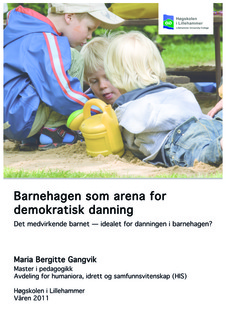Barnehagen som arena for demokratisk danning : det medvirkende barnet - idealet for danningen i barnehagen?
Master thesis
Permanent lenke
http://hdl.handle.net/11250/144719Utgivelsesdato
2011Metadata
Vis full innførselSamlinger
Sammendrag
The subject of this study is child participation and formation in the kindergarten. It points at
conflicting tendencies in the debate about kindergartens. The kindergarten should contribute to children's formation and participation. At the same time, we are talking about early preparation for school, survey and evaluation. This study will investigate if these tendencies are compatible. Furthermore, the intention is to highlight how formation can fit into the kindergarten, together with children's right to participation. What is a democratically formed child? How can a democratically forming practice be established within the kindergarten? This is a theoretical literature study associated with hermeneutics. Literature searches are used in order to gain an understanding of the terms formation and participation. This is tied in with the underlying thought of the hermeneutical spiral.
Formation has proven to be a relevant perspective that can promote a higher understanding of the right to participation. Formation and participation together represent the opportunity to take the child as a subject seriously. Democratical formation should be a deciding factor for what is emphasized in kindergarten pedagogy — what is the purpose of the kindergarten. Kindergartens are required to emphasize formation and participation as the predominant purpose. In order for these perspectives to have a stronger position in the kindergarten, it might be necessary to give a more precise definition of what measures are required from the kindergarten. It is also necessary with a specification of what the kindergarten is and what it is not. If a formalist thinking about children and the kindergarten are allowed to dominate, the kindergarten might lose it's identity as a pedagogical institution that maintain the "whole" human being. Survey, evaluation and control could be an attempt to normalize children in the kindergarten. If so, human diversity would be in decay.
Formation and participation represent freedom and protest against formalistic tendencies
overtaking pedagogy in the kindergarten. Formalism and formation are two principally
conflicting approaches. With formation and participation, the human being is the focus of
attention, while formalism represent other objectives for the pedagogical work. These
tendencies are therefor not compatible approaches, which leads to conflicting goals for the kindergarten.
